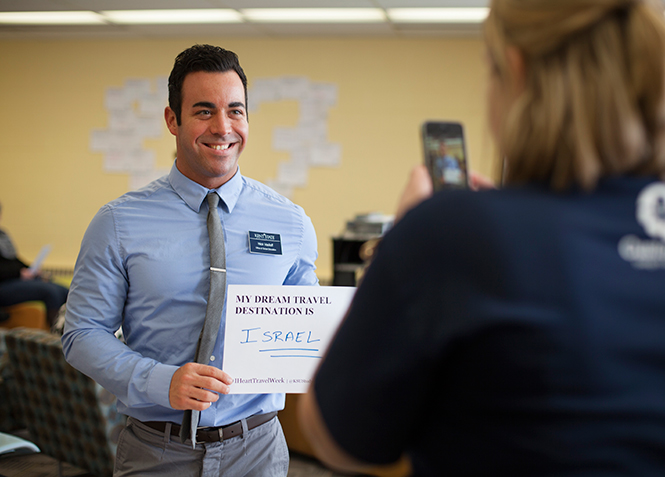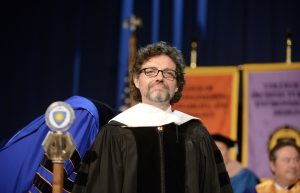Language barriers prevent abroad opportunities
Employee for the Office of Global Education Nick Vasiloff holds up his sign which reads that his dream place to travel is Israel, at the I Love Travel Week event in the Kent State library Wednesday, Feb. 12, 2014.
April 14, 2014
Kent State study abroad offers students a wide variety of options when choosing which programs to study through as well as many destination opportunities for travel.
However, multiple programs that study abroad offers have faded out due to the lack of language proficiencies in the desired areas of study. Ediz Kaykayoglu, assistant director of education abroad, said students lack interest because of certain countries due to this problem.
“Interests are shifting in certain programs because of the way students want to learn,” Kaykayoglu said. “They [students] would prefer to learn in English because that is the language they are most proficient in.”
Kaykayoglu said programs in Germany have become less popular due to the German structure of teaching.
“It is becoming harder to find students to go through German exchange partners because the German teaching structure does not have many courses taught in English,” Kaykayoglu said. “It requires a high language proficiency in German, which keeps students with a lack of fluency in German from traveling.”
Kaykayoglu said other programs that have shown less interest over the years include third-party programs such as the International Student Exchange Program, ISEP.
“We tend to see less interest in the programs through ISEP only because it is not directly through Kent State,” Kaykayoglu said.
Kaykayoglu said the Florence and Geneva programs are the most popular and have been for years.
“Both of these programs have their own Kent State center, which makes the idea of traveling to a different country more familiar and comfortable,” Kaykayoglu said. “It is like traveling to an off-campus branch in a different country.”
Although the Florence and Geneva programs are the most popular, the Office of Global Education is always pushing students to travel elsewhere as well, said Nick Vasiloff, study abroad and exchange student adviser said.
“I would love to see more students travel to Latin America and South America,” Vasiloff said. “These are spots that are very untouched.”
Vasiloff said he believes the European programs are always considerable options, but there are many other programs for students to choose from.
“The less popular programs outside of Europe can provide more integration that is perhaps more beneficial for students who truly apply themselves to that experience,” Vasiloff said.
Elizabeth Davis,study abroad and exchange student adviser, said she would like to see more students travel to Asia, especially places like South Korea and Japan.
“Studying abroad makes you stand out, but I believe studying in places like this makes you stand out so much more,” Davis said. “Additionally, there are many scholarship opportunities throughout Asia, so studying there can be very affordable.”
Study abroad advisers are located at the Office of Global Education and are available to provide details on education abroad options, travel destinations and funding opportunities.
Contact Chelsey Milkovich at [email protected].

























